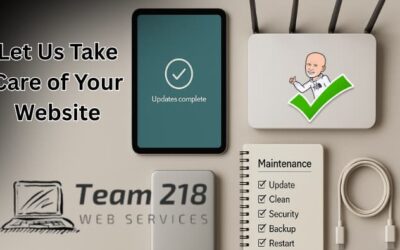Website Security: Best Practices for Protecting Your Website
Introduction
Website security is an important component of modern web construction. With the growing amount of cyber threats and criminal actions, it’s critical to have best practices in place to safeguard your website from potential security breaches. This blog post will go through the top website security best practices that will help you maintain your site safe from hackers and cyber threats.
Make use of Secure Authentication.
The process of confirming the identification of visitors who access your website is known as authentication. It is critical to establish strong and unique usernames and passwords to prevent illegal access to your website. Avoid using common usernames and passwords, and change them on a regular basis. Wherever practical, employ multi-factor authentication (MFA), which adds an extra layer of protection by asking users to present two or more pieces of evidence to validate their identity.
Maintain Software Updates
It is critical to keep your website’s software up to date in order to keep it secure. This includes not only your content management system (CMS) or website builder, but also any plugins, themes, and other software components. Outdated software may contain security flaws that hackers can exploit. To guarantee optimal protection against potential security risks, keep all software up to date with the latest security patches and upgrades.
Make use of HTTPS and SSL.
Encrypting data exchanged between your website and its visitors with HTTPS (Hypertext Transfer Protocol Secure) and SSL (Secure Sockets Layer) is critical. SSL establishes a secure connection between the web server and the user’s browser, whereas HTTPS encrypts data to prevent eavesdropping and tampering. Obtain a valid SSL certificate for your website and configure your server to enforce HTTPS to prevent malicious actors from intercepting sensitive information such as usernames, passwords, and payment data.
Make regular backups of your website.
Backing up your website on a regular basis is an important component of website security. A recent backup can help you swiftly restore your website to a secure condition in the case of a security compromise or data loss. Backups should be stored in a secure area, preferably offsite, and the restoration procedure should be tested to confirm the backups are working effectively.
Make use of security plugins and firewalls.
Adding security plugins and firewalls to your website might provide an extra layer of protection. For several CMS platforms, security plugins and firewalls are available to detect and block harmful actions such as brute force attacks, SQL injections, and cross-site scripting (XSS) attacks. Update and configure these plugins and firewalls on a regular basis to ensure that they are successfully protecting your website from potential security risks.
Conduct Security Audits on a Regular Basis
Regular security audits can assist you in identifying and addressing potential flaws in your website’s security. Conduct rigorous security audits to evaluate the security posture of your website, including a look for weak passwords, obsolete software, misconfigured permissions, and other potential security issues. Address any discovered vulnerabilities as soon as possible to ensure the security of your website.
Inform Your Users
Educating your users on best practices for website security can help maintain your site secure. Give your website’s users instructions on how to create strong passwords, avoid clicking on questionable links or downloading unexpected attachments, and be cautious when sharing personal information online. To prevent security breaches, remind your users to follow these security best practices on a regular basis.
Finally,
Website security is an important part of online development and site administration. You can significantly reduce the risk of security breaches and keep your website safe by implementing best practices such as using secure authentication, keeping software updated, using HTTPS and SSL, regularly backing up your website, using security plugins and firewalls, conducting regular security audits, and educating your users.
If you need help with your website, get in touch with Team 218. 319-333-0815








0 Comments